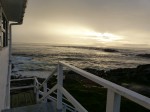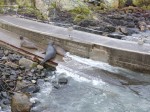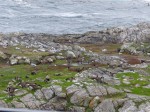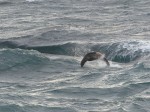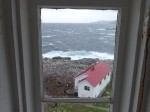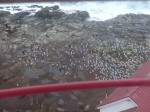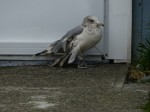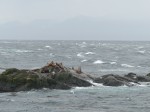Light SE wind in the morning. 3ft East swell.
Midday it switched to 25 kts West.
Late afternoon it was blowing 45 kts West. With a 5ft+ West swell.
Bird Count
26 Canada Geese spent the day sheltering from the storm on Greater Race Rock
670 Adult Gulls + 96 Juvenile Gulls = 766 Gulls total
20 Oyster Catchers
136 Cormorants
I don’t know where the Turnstones and Sparrows hide during bad weather
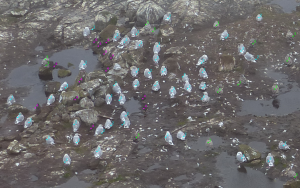
How I counted Birds: The nice thing about bad weather is that it forces all the birds to come to Greater Race Rock because of the waves surging over the outer islands. They also tend to sit in organized groups when it’s really windy. So I took photos of all the groups of birds and using a ‘cell counter’ macro in a great free program called ImageJ I counted all the birds and tallied the results.
- (Do do dooo) looking out my back door…East at dawn, with the low Easterly swell.
- Elephant seals on the boat ramp making grumpy faces and growling at the surge that dsiturbed their nap
- Canada Geese hiding from the wind in a depression in the rocks
- A Sea lion playing in the surge over the South reef
- Looking at the Student house from the tower.
- Glaucus winged gulls lined up and facing into the wind
- The last remaining gull with a broken wing spent the day hiding in the shelter of the keeper’s house basement door
- Sea lions on South Rocks, not really caring that there are 40 kt winds
[Daily Marine Conservation Link]
Sea stars up and down both coasts of North America are experience a mass die-off event now called Sea Star Wasting Syndrome. In recent years the populations of sea stars has been extremely high in the Salish Sea, and in September 2013 reports of mortality events started coming in from divers. A collaborative research effort is now underway and the Vancouver Aquarium is hoping that divers start to participate in some Citizen Science.
The Howe Sound Research and Conservation team is tracking this event by mapping observations of healthy and sick sea stars but they need data! So if you see any sea stars while diving report it to this website
